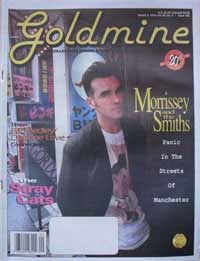Rush - 'Counterparts'
By Michael Wright, Goldmine, March 4, 1994, transcribed by Meg Jahnke

It's been 20 years now since Rush stormed out of Canada with slashing guitars (often inaccurately described as "heavy metal"), mellifluous bass and thundering drums, spinning yarns combining science fiction trappings with the archetypal search for self identity with which so many teenagers (and not a few middle-agers) could readily identify. Staying true to their historical penchant for producing "concept" - or at least thematically unified - albums, Counterparts blends dreamscapes and philosophical poetry in an exploration of yin/yang, necessary opposites, apparent contradictions which hold the world together in tension and resolution. (It's a sign of Rush's nature that discussing them leads immediately to abstract language...)
Following this theme, Geddy Lee's distinctive tenor soars through Neil Peart's ruminations about heroism, sex, competition/cooperation, and exhortations about existential perseverance. As usual, Peart's lyrics favor staccato images, short phrases pregnant with oblique meaning or carrying a sparse narrative that brims full of aphoristic truth.
Musically speaking, Rush has stripped off some of the lusher production for a rougher edge that emphasizes the trio form, although any "roughness" has to do with sonic illusion, since it's hard to imagine much more polished musicians than these three. Alex Lifeson's guitar playing is lean and tough, crunching chords or following the melody tightly, only occasionally stepping out to rip through a succinct solo which is always the picture of musical perfection, taking the song to the brink before pulling back. Such compressed energy, subjecting ego to the song, is no doubt why Lifeson has been one of the more underrated guitarists for years. It's probably for the best, because if he ever really let his hair down, it just might well precipitate the Big One.
Lee and Peart are no slouches, either. Lee's punchy bass style is extremely melodic, acting as a bass voice in a classical sense rather than playing an oom-pah dance-band role. Moving in and around it all are Peart's kinetic, ever-creative drum parts.
Counterparts marks no new changes in direction for Rush, which will probably not disappoint fans, and would be a rather radical departure for a band with such a steady output, after all. Neither are there new revelations, just plenty of artful concept music, spotlessly played and exquisitely produced. Sometimes one wishes they'd go ahead and get a little crazier once in awhile, but then, that wouldn't be Rush, would it? And this is definitely that.